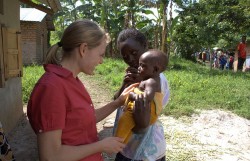Healthy Child Uganda: Improving lives through education and volunteerism
Despite its short twelve-year history, Healthy Child Uganda (HCU) has made a big impact: providing input on national policy, working with Uganda’s Minister of Health and other officials on child and maternal health issues and catching the attention of policy makers and partners (i.e. UNICEF) who want to see firsthand how HCU facilities operate.
HCU also works with communities and local leaders to run 50 mother-child friendly health facilities, oversee 3500 Village Health Team members, and train health district leaders.
“For more than 10 years, HCU has worked with community health volunteers through local government structures to improve the health of mothers, newborns and children in south western Uganda,” said Teddy Kyomuhangi, Project Manager of HCU at Mbarara University of Science and Technology (MUST).
Much of this success is based on the program’s community-oriented approach, says Ms. Kyomuhangi.
“It is very possible for communities to volunteer to help each other through simple education to improve their own lives,” she said. “This has been demonstrated through the community health worker programme where through health education, home visits, identification of danger signs in children, newborns and mothers by community health workers and referrals has caused a significant improvement in key maternal newborn and child health indicators in the areas where we work.”
Healthy Child Uganda is a partnership between MUST, the University of Calgary, the Canadian Paediatric Society and other Ugandan and Canadian organizations.
It’s a partnership that has allowed HCU to make a significant contribution to maternal and child health in Uganda, said Dr. Jenn Brenner, paediatrician at the University of Calgary and Canadian Director of HCU.
Dr. Jerome Kabakyenga, Ugandan Director of HCU, agrees. The partnership has provided the opportunity for HCU to grow and have a larger impact on the areas it serves.
“HCU has evolved from working with small communities (villages) in 2003 to working with two districts with a combined population of about 450,000 people,” said Dr. Kabakyenga.
For more information, visit www.healthychilduganda.org
Copyright
The Canadian Paediatric Society holds copyright on all information we publish on this blog. For complete details, read our Copyright Policy.
Disclaimer
The information on this blog should not be used as a substitute for medical care and advice. The views of blog writers do not necessarily represent the views of the Canadian Paediatric Society.
enfants-en-sante-ouganda-ameliorer-des-vies-grace-a-leducationLast updated: Jun 15, 2015

